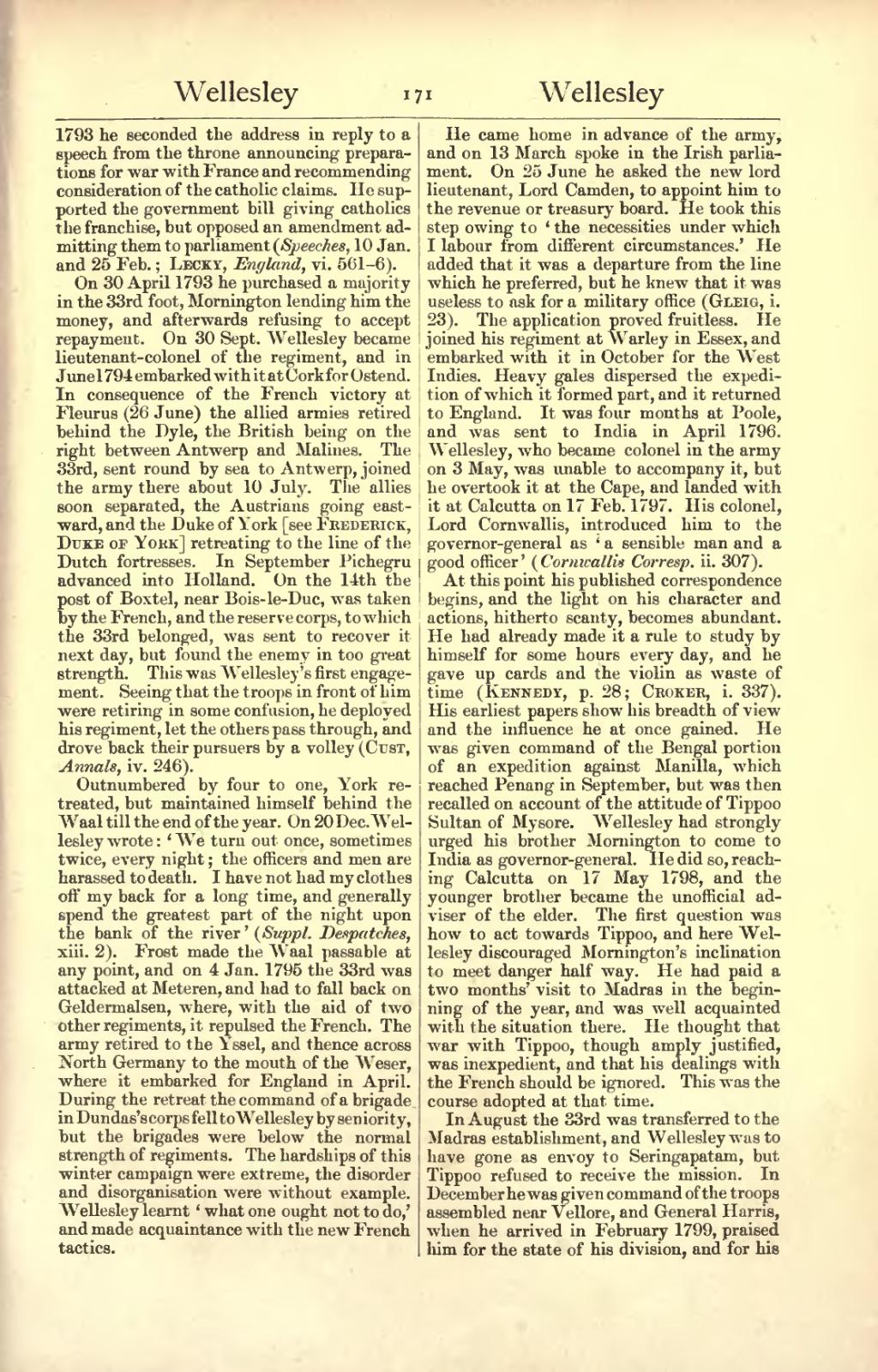1793 he seconded the address in reply to a speech from the throne announcing preparations for war with France and recommending consideration of the catholic claims. He supported the government bill giving catholics the franchise, but opposed an amendment admitting them to parliament (Speeches, 10 Jan. and 25 Feb.; Lecky, England, vi. 561–6).
On 30 April 1793 he purchased a majority in the 33rd foot, Mornington lending him the money, and afterwards refusing to accept repayment. On 30 Sept. Wellesley became lieutenant-colonel of the regiment, and in June 1794 embarked with it at Cork for Ostend. In consequence of the French victory at Fleurus (26 June) the allied armies retired behind the Dyle, the British being on the right between Antwerp and Malines. The 33rd, sent round by sea to Antwerp, joined the army there about 10 July. The allies soon separated, the Austrians going eastward, and the Duke of York [see Frederick, Duke of York] retreating to the line of the Dutch fortresses. In September Pichegru advanced into Holland. On the 14th the post of Boxtel, near Bois-le-Duc, was taken by the French, and the reserve corps, to which the 33rd belonged, was sent to recover it next day, but found the enemy in too great strength. This was Wellesley's first engagement. Seeing that the troops in front of him were retiring in some confusion, he deployed his regiment, let the others pass through, and drove back their pursuers by a volley (Cust, Annals, iv. 246).
Outnumbered by four to one, York retreated, but maintained himself behind the Waal till the end of the year. On 20 Dec. Wellesley wrote: 'We turn out once, sometimes twice, every night; the officers and men are harassed to death. I have not had my clothes off my back for a long time, and generally spend the greatest part of the night upon the bank of the river' (Suppl. Despatches, xiii. 2). Frost made the Waal passable at any point, and on 4 Jan. 1795 the 33rd was attacked at Meteren, and had to fall back on Geldermalsen, where, with the aid of two other regiments, it repulsed the French. The army retired to the Yssel, and thence across North Germany to the mouth of the Weser, where it embarked for England in April. During the retreat the command of a brigade in Dundas's corps fell to Wellesley by seniority, but the brigades were below the normal strength of regiments. The hardships of this winter campaign were extreme, the disorder and disorganisation were without example. Wellesley learnt 'what one ought not to do,' and made acquaintance with the new French tactics.
He came home in advance of the army, and on 13 March spoke in the Irish parliament. On 25 June he asked the new lord lieutenant, Lord Camden, to appoint him to the revenue or treasury board. He took this step owing to 'the necessities under which I labour from different circumstances.' He added that it was a departure from the line which he preferred, but he knew that it was useless to ask for a military office (Gleig, i. 23). The application proved fruitless. He joined his regiment at Warley in Essex, and embarked with it in October for the West Indies. Heavy gales dispersed the expedition of which it formed part, and it returned to England. It was four months at Poole, and was sent to India in April 1796. Wellesley, who became colonel in the army on 3 May, was unable to accompany it, but he overtook it at the Cape, and landed with it at Calcutta on 17 Feb. 1797. His colonel, Lord Cornwallis, introduced him to the governor-general as 'a sensible man and a good officer' (Cornwallis Corresp. ii. 307).
At this point his published correspondence begins, and the light on his character and actions, hitherto scanty, becomes abundant. He had already made it a rule to study by himself for some hours every day, and he gave up cards and the violin as waste of time (Kennedy, p. 28; Croker, i. 337). His earliest papers show his breadth of view and the influence he at once gained. He was given command of the Bengal portion of an expedition against Manilla, which reached Penang in September, but was then recalled on account of the attitude of Tippoo Sultan of Mysore. Wellesley had strongly urged his brother Mornington to come to India as governor-general. He did so, reaching Calcutta on 17 May 1798, and the younger brother became the unofficial adviser of the elder. The first question was how to act towards Tippoo, and here Wellesley discouraged Mornington's inclination to meet danger half way. He had paid a two months' visit to Madras in the beginning of the year, and was well acquainted with the situation there. He thought that war with Tippoo, though amply justified, was inexpedient, and that his dealings with the French should be ignored. This was the course adopted at that time.
In August the 33rd was transferred to the Madras establishment, and Wellesley was to have gone as envoy to Seringapatam, but Tippoo refused to receive the mission. In December he was given command of the troops assembled near Vellore, and General Harris, when he arrived in February 1799, praised him for the state of his division, and for his
